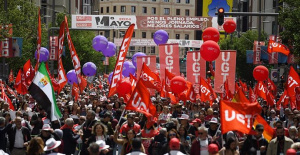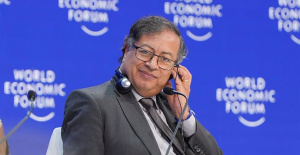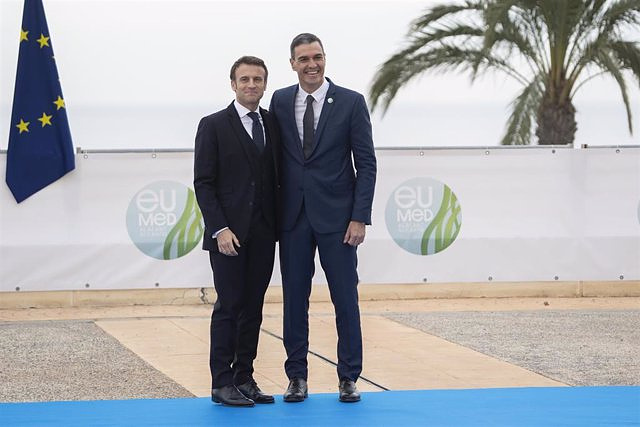The text provides for the creation of a Defense and Security Council and a working group on migration issues
MADRID, 17 Ene. (EUROPA PRESS) -
The President of the Government, Pedro Sánchez, and the French president, Emmanuel Macron, will sign this Thursday in Barcelona a new Friendship and Cooperation Treaty that will place Spain's relationship with France at the level of the country's with Germany and Italy, the only two countries with which it has signed agreements of this type.
From the Élysée, they have highlighted on Tuesday the "symbolic" of the signing of this treaty due to its exceptional nature and they have framed it in the "density and intensity" that already exists in the bilateral relationship as well as in the "convergence" that exists on the main European issues and the willingness of both Macron and Sánchez to further deepen ties.
Precisely, the Council of Ministers has given the green light this Tuesday to the signing of the new treaty, the elaboration of which Sánchez and Macron agreed to at the summit held in March 2021 in Montauban. As Moncloa has highlighted, what is sought is "to systematize and institutionalize the bilateral relationship with France, increasing the ambition of its development and the degree of agreement in numerous areas of shared interest."
In addition, "it establishes a framework for the bilateral relationship between the two countries adapted to the nature of our coordination, not only as neighboring countries, but as Member States of the European Union and NATO allies", the Government specified in the reference to the Minister council.
The text consists of a preamble and ten titles, the last one incorporating a series of final provisions, with a total of 36 articles.
The preamble includes the principles on which this relationship is based, the goals it pursues --the deepening of cooperation and strategic coordination, including cross-border cooperation and with outermost regions-- and the framework in which this relationship is developed.
In terms of foreign and defense policy, included in Title III, the creation of a Franco-Spanish Defense and Security Council made up of the Ministers of Foreign Affairs and Defense of both countries is foreseen, which will meet annually to examine policy issues. foreign affairs and advances in defense and security policy.
With regard to cooperation in matters of justice and home affairs, which is addressed in Title VI, the promotion of structured dialogue mechanisms between the two administrations is foreseen, especially through periodic consultations between the Ministers of the Interior and the creation of a Franco-Spanish working group on migration issues.
Likewise, as Moncloa has specified, it is expected that the Ministers of Culture have annual consultations and that the ministers responsible for economic, commercial, industrial and digital affairs meet periodically to promote new cooperation in their areas of competence. In addition, the parties will promote the annual organization of a bilateral economic and business forum.
In title VII, relating to sustainable development, energy, transport, agriculture and food, Spain and France reaffirm their commitment to the development of interconnections between the two countries, as well as to the Common Agricultural Policy and the Common Fisheries Policy, also recalling the importance of the Mixed Agricultural Committees in various productive sectors.
In health matters, the recognition of health and medical diplomas from both countries is stipulated, while in labor matters it is planned to create an annual working group among the competent ministries on the promotion of decent and quality work, minimum wages , social dialogue, social inclusion, the social and solidarity economy and its financing, gender equality and social protection.
Finally, the creation of a consultative Border Cooperation Committee is also contemplated, made up of representatives of the competent administrations to monitor a cross-border cooperation strategy.
Moncloa has clarified that the Friendship and Cooperation Treaty "contains political declarations and programmatic commitments that do not generate financial obligations for the Public Treasury or commit the disbursement of funds."

 Exploring Cardano: Inner Workings and Advantages of this Cryptocurrency
Exploring Cardano: Inner Workings and Advantages of this Cryptocurrency Seville.- Economy.- Innova.- STSA inaugurates its new painting and sealing hangar in San Pablo, for 18 million
Seville.- Economy.- Innova.- STSA inaugurates its new painting and sealing hangar in San Pablo, for 18 million Innova.- More than 300 volunteers join the Andalucía Compromiso Digital network in one month to facilitate access to ICT
Innova.- More than 300 volunteers join the Andalucía Compromiso Digital network in one month to facilitate access to ICT Innova.-AMP.- Ayesa acquires 51% of Sadiel, which will create new technological engineering products and expand markets
Innova.-AMP.- Ayesa acquires 51% of Sadiel, which will create new technological engineering products and expand markets COMUNICADO: Energy Transitions Commission (ETC) Urges Government and Industry Collaboration to Overcome Perceptions of Offshore Wind
COMUNICADO: Energy Transitions Commission (ETC) Urges Government and Industry Collaboration to Overcome Perceptions of Offshore Wind UGT and CCOO demand the regeneration of democracy, better salaries and a reduction in working hours
UGT and CCOO demand the regeneration of democracy, better salaries and a reduction in working hours Alcaraz gives up his reign in Madrid against Rublev
Alcaraz gives up his reign in Madrid against Rublev Petro announces that Colombia will break diplomatic relations with Israel
Petro announces that Colombia will break diplomatic relations with Israel How Blockchain in being used to shape the future
How Blockchain in being used to shape the future Not just BTC and ETH: Here Are Some More Interesting Coins Worth Focusing on
Not just BTC and ETH: Here Are Some More Interesting Coins Worth Focusing on Ivace and promotes a less invasive device for the early detection of prostate cancer
Ivace and promotes a less invasive device for the early detection of prostate cancer Valencia unanimously approves the ordinance to allocate spaces to test innovative initiatives
Valencia unanimously approves the ordinance to allocate spaces to test innovative initiatives UPV researchers promote a paid master's degree as a "talent factory" in integrated photonics
UPV researchers promote a paid master's degree as a "talent factory" in integrated photonics A spin-off of the UV works on obtaining high-resolution 3D biomedical images in real time
A spin-off of the UV works on obtaining high-resolution 3D biomedical images in real time A million people demonstrate in France against Macron's pension reform
A million people demonstrate in France against Macron's pension reform Russia launches several missiles against "critical infrastructure" in the city of Zaporizhia
Russia launches several missiles against "critical infrastructure" in the city of Zaporizhia A "procession" remembers the dead of the Calabria shipwreck as bodies continue to wash up on the shore
A "procession" remembers the dead of the Calabria shipwreck as bodies continue to wash up on the shore Prison sentences handed down for three prominent Hong Kong pro-democracy activists
Prison sentences handed down for three prominent Hong Kong pro-democracy activists ETH continues to leave trading platforms, Ethereum balance on exchanges lowest in 3 years
ETH continues to leave trading platforms, Ethereum balance on exchanges lowest in 3 years Investors invest $450 million in Consensys, Ethereum incubator now valued at $7 billion
Investors invest $450 million in Consensys, Ethereum incubator now valued at $7 billion Alchemy Integrates Ethereum L2 Product Starknet to Enhance Web3 Scalability at a Price 100x Lower Than L1 Fees
Alchemy Integrates Ethereum L2 Product Starknet to Enhance Web3 Scalability at a Price 100x Lower Than L1 Fees Mining Report: Bitcoin's Electricity Consumption Declines by 25% in Q1 2022
Mining Report: Bitcoin's Electricity Consumption Declines by 25% in Q1 2022 Oil-to-Bitcoin Mining Firm Crusoe Energy Systems Raised $505 Million
Oil-to-Bitcoin Mining Firm Crusoe Energy Systems Raised $505 Million Microbt reveals the latest Bitcoin mining rigs -- Machines produce up to 126 TH/s with custom 5nm chip design
Microbt reveals the latest Bitcoin mining rigs -- Machines produce up to 126 TH/s with custom 5nm chip design Bitcoin's Mining Difficulty Hits a Lifetime High, With More Than 90% of BTC Supply Issued
Bitcoin's Mining Difficulty Hits a Lifetime High, With More Than 90% of BTC Supply Issued The Biggest Movers are Near, EOS, and RUNE during Friday's Selloff
The Biggest Movers are Near, EOS, and RUNE during Friday's Selloff Global Markets Spooked by a Hawkish Fed and Covid, Stocks and Crypto Gain After Musk Buys Twitter
Global Markets Spooked by a Hawkish Fed and Covid, Stocks and Crypto Gain After Musk Buys Twitter Bitso to offset carbon emissions from the Trading Platform's ERC20, ETH, and BTC Transactions
Bitso to offset carbon emissions from the Trading Platform's ERC20, ETH, and BTC Transactions Draftkings Announces 2022 College Hoops NFT Selection for March Madness
Draftkings Announces 2022 College Hoops NFT Selection for March Madness



























